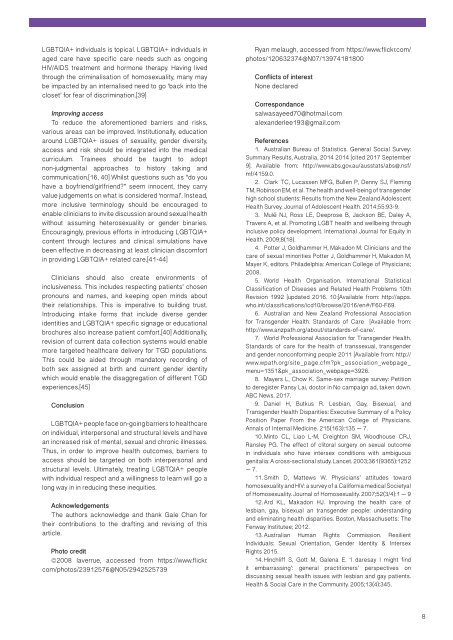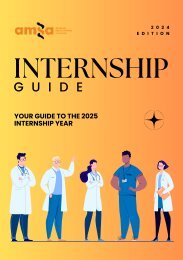Vector Volume 11 Issue 2 - 2017
You also want an ePaper? Increase the reach of your titles
YUMPU automatically turns print PDFs into web optimized ePapers that Google loves.
LGBTQIA+ individuals is topical. LGBTQIA+ individuals in<br />
aged care have specific care needs such as ongoing<br />
HIV/AIDS treatment and hormone therapy. Having lived<br />
through the criminalisation of homosexuality, many may<br />
be impacted by an internalised need to go ‘back into the<br />
closet’ for fear of discrimination.[39]<br />
Improving access<br />
To reduce the aforementioned barriers and risks,<br />
various areas can be improved. Institutionally, education<br />
around LGBTQIA+ issues of sexuality, gender diversity,<br />
access and risk should be integrated into the medical<br />
curriculum. Trainees should be taught to adopt<br />
non-judgmental approaches to history taking and<br />
communication.[16, 40] Whilst questions such as “do you<br />
have a boyfriend/girlfriend?” seem innocent, they carry<br />
value judgements on what is considered ‘normal’. Instead,<br />
more inclusive terminology should be encouraged to<br />
enable clinicians to invite discussion around sexual health<br />
without assuming heterosexuality or gender binaries.<br />
Encouragingly, previous efforts in introducing LGBTQIA+<br />
content through lectures and clinical simulations have<br />
been effective in decreasing at least clinician discomfort<br />
in providing LGBTQIA+ related care.[41-44]<br />
Clinicians should also create environments of<br />
inclusiveness. This includes respecting patients’ chosen<br />
pronouns and names, and keeping open minds about<br />
their relationships. This is imperative to building trust.<br />
Introducing intake forms that include diverse gender<br />
identities and LGBTQIA+ specific signage or educational<br />
brochures also increase patient comfort.[40] Additionally,<br />
revision of current data collection systems would enable<br />
more targeted healthcare delivery for TGD populations.<br />
This could be aided through mandatory recording of<br />
both sex assigned at birth and current gender identity<br />
which would enable the disaggregation of different TGD<br />
experiences.[45]<br />
Conclusion<br />
LGBTQIA+ people face on-going barriers to healthcare<br />
on individual, interpersonal and structural levels and have<br />
an increased risk of mental, sexual and chronic illnesses.<br />
Thus, in order to improve health outcomes, barriers to<br />
access should be targeted on both interpersonal and<br />
structural levels. Ultimately, treating LGBTQIA+ people<br />
with individual respect and a willingness to learn will go a<br />
long way in in reducing these inequities.<br />
Acknowledgements<br />
The authors acknowledge and thank Gale Chan for<br />
their contributions to the drafting and revising of this<br />
article.<br />
Photo credit<br />
©2008 laverrue, accessed from https://www.flickr.<br />
com/photos/23912576@N05/2942525739<br />
Ryan melaugh, accessed from https://www.flickr.com/<br />
photos/120632374@N07/13974181800<br />
Conflicts of interest<br />
None declared<br />
Correspondance<br />
salwasayeed70@hotmail.com<br />
alexanderlee193@gmail.com<br />
References<br />
1. Australian Bureau of Statistics. General Social Survey:<br />
Summary Results, Australia, 2014 2014 [cited <strong>2017</strong> September<br />
9]. Available from: http://www.abs.gov.au/ausstats/abs@.nsf/<br />
mf/4159.0.<br />
2. Clark TC, Lucassen MFG, Bullen P, Denny SJ, Fleming<br />
TM, Robinson EM, et al. The health and well-being of transgender<br />
high school students: Results from the New Zealand Adolescent<br />
Health Survey. Journal of Adolescent Health. 2014;55:93-9.<br />
3. Mulé NJ, Ross LE, Deeprose B, Jackson BE, Daley A,<br />
Travers A, et al. Promoting LGBT health and wellbeing through<br />
inclusive policy development. International Journal for Equity in<br />
Health. 2009;8(18).<br />
4. Potter J, Goldhammer H, Makadon M. Clinicians and the<br />
care of sexual minorities Potter J, Goldhammer H, Makadon M,<br />
Mayer K, editors. Philadelphia: American College of Physicians;<br />
2008.<br />
5. World Health Organisation. International Statistical<br />
Classification of Diseases and Related Health Problems 10th<br />
Revision 1992 [updated 2016. 10:[Available from: http://apps.<br />
who.int/classifications/icd10/browse/2016/en#/F60-F69.<br />
6. Australian and New Zealand Professional Association<br />
for Transgender Health. Standards of Care [Available from:<br />
http://www.anzpath.org/about/standards-of-care/.<br />
7. World Professional Association for Transgender Health.<br />
Standards of care for the health of transsexual, transgender<br />
and gender nonconforming people 20<strong>11</strong> [Available from: http://<br />
www.wpath.org/site_page.cfm?pk_association_webpage_<br />
menu=1351&pk_association_webpage=3926.<br />
8. Mayers L, Chow K. Same-sex marriage survey: Petition<br />
to deregister Pansy Lai, doctor in No campaign ad, taken down.<br />
ABC News. <strong>2017</strong>.<br />
9. Daniel H, Butkus R. Lesbian, Gay, Bisexual, and<br />
Transgender Health Disparities: Executive Summary of a Policy<br />
Position Paper From the American College of Physicians.<br />
Annals of Internal Medicine. 215(163):135 — 7.<br />
10. Minto CL, Liao L-M, Creighton SM, Woodhouse CRJ,<br />
Ransley PG. The effect of clitoral surgery on sexual outcome<br />
in individuals who have intersex conditions with ambiguous<br />
genitalia: A cross-sectional study. Lancet. 2003;361(9365):1252<br />
— 7.<br />
<strong>11</strong>. Smith D, Mattews W. Physicians’ attitudes toward<br />
homosexuality and HIV: a survey of a California medical Societyal<br />
of Homosexuality. Journal of Homosexuality. 2007;52(3/4):1 — 9<br />
12. Ard KL, Makadon HJ. Improving the health care of<br />
lesbian, gay, bisexual an transgender people: understanding<br />
and eliminating health disparities. Boston, Massachusetts: The<br />
Fenway Institutee; 2012.<br />
13. Australian Human Rights Commission. Resilient<br />
Individuals: Sexual Orientation, Gender Identity & Intersex<br />
Rights 2015.<br />
14. Hinchliff S, Gott M, Galena E. ‘I daresay I might find<br />
it embarrassing’: general practitioners’ perspectives on<br />
discussing sexual health issues with lesbian and gay patients.<br />
Health & Social Care in the Community. 2005;13(4):345.<br />
8

















